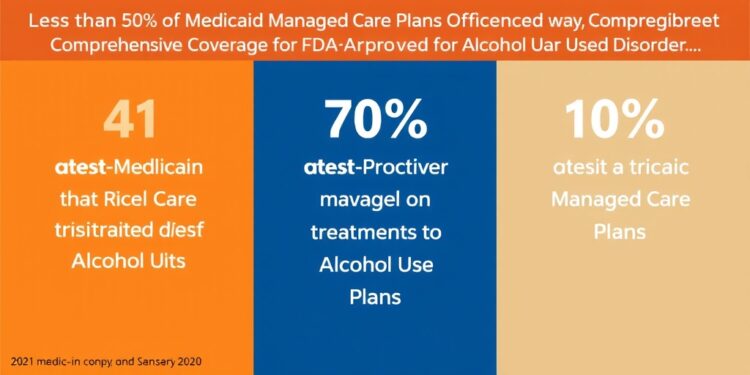As alcohol use disorder (AUD) continues to pose a significant health challenge in the United States, recent research sheds light on the accessibility of FDA-approved medications designed to combat this affliction. Despite the alarming statistics indicating increased health complications and mortality rates associated with AUD, access to effective treatments remains frustratingly limited, especially for low-income individuals enrolled in Medicaid. This demographic, which constitutes a significant portion of those affected by AUD, faces considerable barriers in obtaining life-saving medications.
The investigation, recently published in JAMA Network Open, underscores a discrepancy in medication coverage among Medicaid managed care plans. Notably, the findings indicate that less than half of these plans offer comprehensive coverage for all four federally approved medications: acamprosate, disulfiram, oral naltrexone, and injectable naltrexone. While a majority of plans do provide access to at least one medication, the lack of coverage for the entire suite poses a significant obstacle to effective treatment of AUD.
Naltrexone, particularly in its oral and injectable forms, emerges as the most widely covered medication, though it is concerning that such a high percentage of plans do not offer the full range of options. Nearly 84 percent of Medicaid managed care plans cover the oral version of naltrexone, and about 73 percent provide coverage for the injectable formulation. In comparison, just 63 percent cover disulfiram, and only 55 percent include acamprosate in their formularies. This uneven access can lead to differing patient outcomes based on medication availability and individual response to treatment.
Dr. Maureen Stewart, the study’s lead researcher and a dedicated advocate for public health policy, articulates the critical importance of having access to all four FDA-approved medications. Each medication carries a unique profile of potential side effects and varying efficacy across different patients. Therefore, limiting coverage to only a few options can undermine a patient’s chance of finding the most suitable treatment for their specific condition.
Moreover, the study reveals that many of the Medicaid managed care plans do not impose stringent controls such as prior authorization for medication prescriptions; however, half of the plans require some form of utilization management for injectable naltrexone. This may contribute to a barrier in accessing the medication, as providers often face cumbersome administrative hurdles when aiming to prescribe a treatment.
The implications of this study extend beyond the individual patient to broader systemic issues within healthcare. The researchers uncovered alarming patterns indicating that Medicaid managed care plans that fail to cover the entirety of available AUD medications are often located in states with high populations of Black, Hispanic, low-income, and rural residents. These groups are disproportionately impacted by alcohol-related health issues, pointing towards a potential public health crisis rooted in inequality in healthcare access.
With over 28 million American adults suffering from AUD, the need for equitable and effective treatment options has never been more pressing. The systemic failures to provide access to these essential medications can exacerbate existing health disparities among marginalized populations. Furthermore, the ongoing discussions and proposed changes regarding Medicaid funding, especially under political administrations that may seek to allocate fewer resources, could drastically jeopardize efforts aimed at reducing the prevalence of AUD.
The availability of low-cost generic versions of three of the four FDA-approved AUD medications further reinforces the argument for expanded coverage. With sensible and economically feasible solutions within reach, the ongoing lack of comprehensive medication access raises urgent questions about the healthcare system’s commitment to addressing alcohol use disorder effectively.
In light of these findings, the study calls for a concerted national effort focused on policy change to reinvigorate treatment strategies for AUD. Addressing the intricacies of Medicaid managed care and ensuring that all FDA-approved medications are available without inequitable obstacles is paramount for advancing treatment options.
Only through decisive actions aimed at increasing the availability of effective treatments can we hope to reduce not only the prevalence but also the consequential morbidity and mortality associated with alcohol use disorder. The data compiled in this study provides an actionable pathway towards establishing comprehensive treatment plans for vulnerable populations and serves as a vital resource for stakeholders engaged in public health and policy reform.
Improving access to AUD medications is not just a matter of health; it is an urgent call for equitable treatment within the healthcare system. In the face of potential funding cuts and ongoing disparities, the study reinforces the imperative for action to ensure that medications designed to support recovery from alcohol use disorder are within reach for all who need them.
Ultimately, the road to better health outcomes for individuals battling AUD lies in understanding the systemic barriers they face and taking proactive steps to dismantle these obstacles within Medicaid managed care frameworks. Increased awareness, research, and subsequent policy changes are essential in fostering an environment where all patients can confidently pursue a path to recovery without the burden of limited treatment options.
Subject of Research: People
Article Title: Alcohol Use Disorder Medication Coverage and Utilization Management in Medicaid Managed Care Plans
News Publication Date: March 17, 2025
Web References:
References:
Image Credits:
Keywords: Alcohol Use Disorder, Medicaid, FDA-approved medications, Healthcare Access, Public Health Policy, Inequities in Health.
Tags: alcohol use disorder treatment accessbarriers to alcohol addiction treatmentBoston University School of Public Health studycomprehensive care for addictionFDA-approved medications for AUDhealth complications from alcohol use disorderhealth disparities in Medicaidlow-income healthcare challengesMedicaid enrollees and treatment accessMedicaid managed care plansmedication coverage discrepanciespublic health implications of AUD





